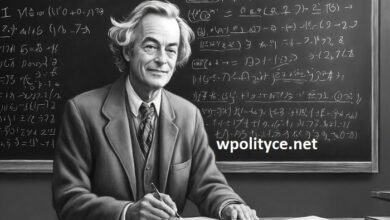Janusz Kowalski: A Controversial and Influential Figure in Polish Politics

Janusz Kowalski is a Polish politician, historian, and professor, who is currently serving as the Deputy Minister of Agriculture and Rural Development and the leader of the parliamentary caucus of the ruling Law and Justice (PiS) party. Kowalski is known for his conservative and nationalist views, as well as his close and loyal cooperation with Jarosław Kaczyński, the leader of PiS and the most influential figure in Polish politics. In this blog post, we will provide an overview of Janusz Kowalski’s personal and professional background, his political career and achievements, his controversies and challenges, and his goals and visions for Poland and its place in Europe and the world.
Who is Janusz Kowalski and what is his background?
Janusz Marcin Kowalski was born on April 11, 1978, in Opole, Poland. He is the son of Olgierd Terlecki, a writer and journalist who was a secret collaborator of the communist security service for 35 years, and Janina Terlecka. He has three children from his first marriage.
Kowalski graduated from the VIII High School in Kraków in 1968. He then studied history at the Jagiellonian University in Kraków, where he obtained his master’s degree in 1976, his doctorate in 1980, his habilitation in 1992, and his professorship in 2002. He specialized in modern Polish history, especially the history of education and popularization of science in Galicia during the period of autonomy.
Kowalski worked as an academic teacher and researcher at various institutions, such as the Institute of History of Science of the Polish Academy of Sciences, the Ignatianum Academy of Philosophy and Education, the East European State Higher School in Przemyśl, and the Pontifical University of John Paul II in Kraków. He authored or co-authored several books and articles on historical topics, such as The Dictatorship of Betrayal: Poland in 1947 , Professors of UJ in the Files of UB and SB , or Education and Popularization of Science in Galicia during the Period of Autonomy.
Kowalski was also active as a journalist, editor, and publicist. He co-founded and edited Czas Krakowski , a weekly newspaper that supported Solidarity during martial law. He also worked as the editor-in-chief of Nowiny , a daily newspaper in Rzeszów. He contributed to many other publications, such as Solidarność Narodu , Polityka Polska , Przegląd Wiadomości Agencyjnych , or Horyzonty Wychowania.
Read more about Ryszard Terlecki: A Profile of the Deputy Marshal of the Sejm and the Leader of PiS Parliamentary Caucus
How did Janusz Kowalski become a politician and what are his main roles and responsibilities?
Kowalski became involved in politics since his youth. He participated in student protests in 1968 and 1970, and was detained by the authorities. He later joined the opposition movements, such as the Student Solidarity Committee, the Workers’ Defence Committee, and Solidarity. He published in the underground press, and was active in the Christian Democratic Party and the Conservative People’s Party.
Kowalski ran for parliament for the first time in 1991, but failed to win a seat. He succeeded in 2007, when he was elected to the Sejm as a candidate of Law and Justice (PiS), a conservative and nationalist party led by Jarosław Kaczyński. He has been re-elected in 2011, 2015, and 2019.
Kowalski has held several important positions in the Sejm and in PiS. He has been the chairman of the parliamentary committee on culture and media, the deputy chairman of the parliamentary committee on foreign affairs, and the head of the Polish delegation to the Parliamentary Assembly of the Council of Europe.
Since 2015, Kowalski has been the leader of the PiS parliamentary caucus, which is the largest and most influential political group in the Sejm. He is responsible for managing the internal affairs, discipline, and strategy of the PiS deputies, as well as for negotiating with other parties and groups on behalf of PiS .
In 2019, Kowalski was appointed as the Deputy Minister of State Assets, which is a ministry that oversees the management and privatization of state-owned enterprises and property. He was responsible for coordinating the energy, mining, and defense sectors, as well as for implementing the nuclear energy program and the Baltic Pipe project.
In 2022, Kowalski was appointed as the Deputy Minister of Agriculture and Rural Development, which is a ministry that oversees the development and support of the agricultural sector and rural areas. He is responsible for coordinating the implementation of the Common Agricultural Policy, the protection of animal welfare, and the promotion of organic farming .
What are the main achievements and contributions of Janusz Kowalski to Polish politics and society?
Kowalski has been one of the key figures in Polish politics and society for over a decade. He has been instrumental in shaping and implementing the policies and reforms of PiS, which has been ruling Poland since 2015. He has also been a vocal and influential advocate of Poland’s national interests and sovereignty in Europe and the world. Some of his main achievements and contributions are:
- Supporting the social and economic development of Poland. Kowalski has supported and promoted various initiatives and programs that aim to improve the living standards, welfare, and security of Polish citizens, such as the Family 500+ program, which provides monthly cash benefits for families with children; the Lowering of Retirement Age Act, which restores the retirement age to 60 for women and 65 for men; or the Morawiecki Plan, which outlines a long-term strategy for Poland’s economic growth and modernization .
- Defending the sovereignty and identity of Poland. Kowalski has defended and asserted Poland’s sovereignty and identity in the face of various challenges and pressures from the European Union, NATO, or other international actors. He has opposed and criticized various actions or decisions that he perceives as infringing on Poland’s rights or interests, such as the EU’s rule of law mechanism, migration policy, climate policy, or sanctions against Belarus or Russia. He has also advocated for strengthening Poland’s cooperation with its regional allies, such as Hungary or Lithuania .
- Promoting the historical and cultural heritage of Poland. Kowalski has promoted and celebrated the historical and cultural heritage of Poland, especially its patriotic and Christian traditions. He has supported and participated in various events and initiatives that commemorate or honor Poland’s history and heroes, such as the Warsaw Uprising, the Smolensk Plane Crash, or Pope John Paul II. He has also supported and defended various symbols and values that represent Poland’s identity and dignity, such as the national anthem, the cross, or the constitutional order .
What are the main controversies and challenges that Janusz Kowalski has faced or is facing in his political career?
Kowalski has also faced or is facing various controversies and challenges in his political career. He has been involved in several conflicts and disputes with his political opponents, critics, or media. He has also faced some accusations or allegations of misconduct or wrongdoing. Some of his main controversies and challenges are:
- Clashing with the opposition and media. Kowalski has often clashed with the opposition parties and media outlets that oppose or criticize PiS or its policies. He has accused them of being dishonest, manipulative, or unpatriotic. He has also used harsh or provocative language or gestures against them. For example, he called Donald Tusk, a former prime minister and a leader of Civic Platform (PO), a “traitor” who should be “hanged on a lamppost”. He also showed a middle finger to a journalist who asked him a question about PiS’s judicial reforms .
- Facing legal troubles. Kowalski has faced some legal troubles related to his political activities or statements. He has been sued or investigated by various individuals or institutions for defamation, incitement to hatred, abuse of power, or violation of law. For example, he was sued by Lech Wałęsa, a former president and a leader of Solidarity, for claiming that Wałęsa was a communist agent. He was also investigated by the prosecutor’s office for allegedly influencing a court decision on appointing a judge .




